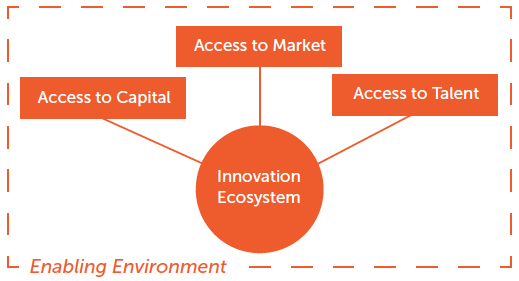Cleantech Innovation Ecosystems Explained
With rising sea levels, summers becoming hotter every year and increasing numbers of natural disasters, the urgency of supportive cleantech innovation ecosystems has never been more evident. In order to reverse the current trend towards further environmental degradation, we need to consider the factors contributing to a well-functioning cleantech innovation ecosystem. In collaboration with Rotterdam School of Management, Erasmus University, we investigated these factors for the municipality of Rotterdam and compiled an extensive report based on the results of an in-depth investigation of the cleantech innovation ecosystems of Rotterdam/ South-Holland and Flanders. The full report can be accessed via this link, and the main takeaways are presented below.
What is cleantech?
Cleantech embodies a new wave of entrepreneurial activity and innovation aiming to create a more sustainable economic system through the development of clean technologies. On top of environmental technologies, cleantech also represents companies that produce productivity and efficiency enhancing goods and services.[1] According to Clean Tech Delta, cleantech activities can be found within the following categories: clean energy, energy storage, energy efficiency, mobility, air & environment, clean industry, water and food.
What is an innovation ecosystem?
Innovation or entrepreneurial ecosystems are combinations of social, political, economic, and cultural elements within a region that support the development and growth of innovative startups. These ecosystems are characterised by the interconnectedness of actors,organisations, institutions, and infrastructure[2] where connections are often considered to have a deterministic function[3]. Based on a study of extant literature, we found that access to talent, access to capital, access to market and the government/policy support contributing to an enabling environment are crucial elements of successful innovation ecosystems.

Cleantech innovation ecosystems
Innovation ecosystems come in many different shapes and sizes. For cleantech innovation ecosystems specifically, we found that the landscape through which startups, scaleups and innovative SMEs need to navigate is especially challenging. Here are some key takeaways from our research into the challenges in cleantech innovation ecosystem:
Access to Talent
Firstly, the type of talent matters and a very specific skillset is necessary to bring cleantech innovations to the market. Cleantech calls for technical, scientific and production knowledge as well as complementary business skills and industry expertise to successfully bring such complex products and services to the market. Our research suggests that sufficient industry-specific expertise is one of the most crucial but challenging types of skills to find.
Access to Capital
In addition, cleantech, unlike other tech industries such as ICT and biotech, is capital-intensive with high upfront costs. Investments are therefore very risky and offer lower returns, which makes it difficult for startups to acquire funding. There is a clearly risk averse funding landscape in the cleantech innovation ecosystem. As such, startups are highly dependent on government support when it comes to accessing capital. There is a funding gap over time and across different financing components for cleantech startups that want to scale up. The issue is not the amount of money in the ecosystem, but how and when this money is distributed
Access to Market
The market for cleantech is also highly regulated, which poses a challenge for startups to navigate in such a complex field. Our findings reveal that the greatest challenges that startups, scaleups and innovative SMEs seem to face in the cleantech innovation ecosystem is related to access to market. It is extremely difficult for startups operating in cleantech to gain credibility from the market and find their first customer in an economy that is in favour of linear business models (based on fossil fuels, for example). Market regulations need to be in favour of circular business models in order for the cleantech innovation ecosystem to thrive.
Enabling Environment: Government and Policy support
The government is a key player in innovation ecosystems in general, but its role in cleantech is even more critical given the peculiarities associated with cleantech activities. The literature suggests many avenues through which the government can support (cleantech) innovation ecosystem, which is in line with the type of support already received via existing local, regional and international projects. Although our findings indicate that cleantech startups indeed rely on various governmental support, it is often to survive and not their preferred option. The cleantech innovation ecosystem needs policies that are more supportive and geared towards enabling rather than stifling cleantech innovations. As confirmed in both the literature study and the results from this research, a regulatory environment that accommodates cleantech solutions is crucial to bring such solutions to the market. However, this study reveals that all cleantech startups see the current regulations as a bottleneck and most cleantech entrepreneurs still face immense challenges to bring their solutions to the market.
How can cleantech innovation ecosystems be more supportive?
This study reveals that first and foremost, there should be an emphasis on creating regulatory support for early-stage cleantech entrepreneurs in access to market. Without a supportive environment, it is difficult for entrepreneurs to enter the market with cleantech solutions. After overcoming this initial barrier of market entry, cleantech entrepreneurs have gained some credibility from the market and seem to face less difficulties in their scale-up phase and require less support. In contrast, early-stage cleantech entrepreneurs seem to face less difficulties in acquiring seed funding in their start-up phase when it comes to access to capital. However, this type of funding is often short-lived and insufficient for them to reach the scale-up phase. Therefore, additional support instruments should have longer time horizons. The intensity of additional support for access to capital and access to market therefore depends on the different stages of the start-up process (see figure below) and ecosystems stakeholders should keep this in mind.
 Want to share/keep the insights from this article? Download the one-pager here!
Want to share/keep the insights from this article? Download the one-pager here!
Interested to know more? Download the full report via this link or reach out to our research team at research@ece.nl!
[1] O’rourke, A. R. (2009). The emergence of cleantech. Yale University.
[2] Johnson, D., Bock, A. J., & George, G. (2019). Entrepreneurial dynamism and the built environment in the evolution of university entrepreneurial ecosystems. Industrial and Corporate Change.
[3] Prokop, D., Huggins, R., & Bristow, G. (2019). The survival of academic spinoff companies: An empirical study of key determinants. International Small Business Journal, 37(5), 502-535.
